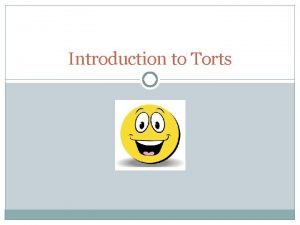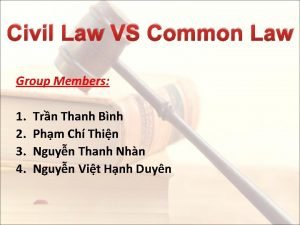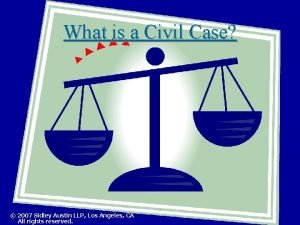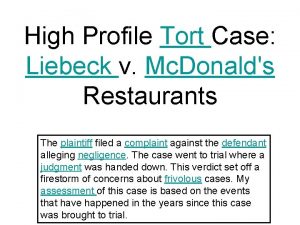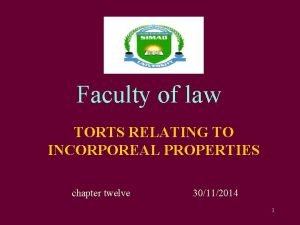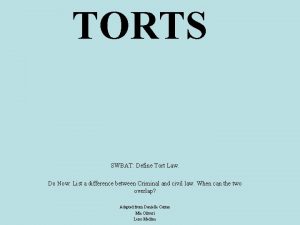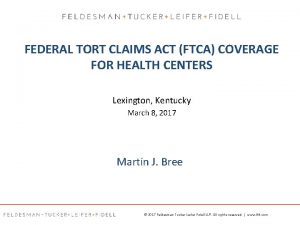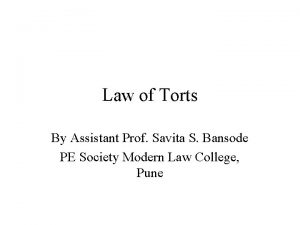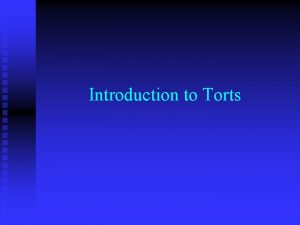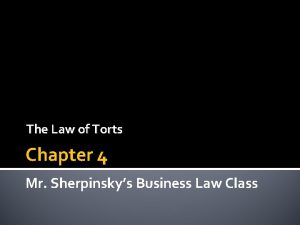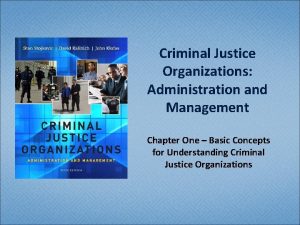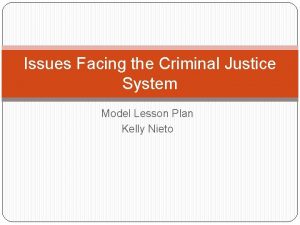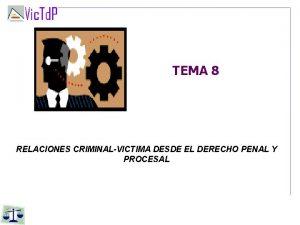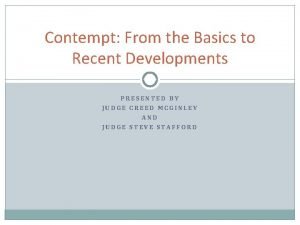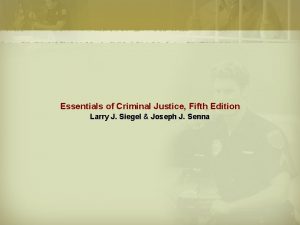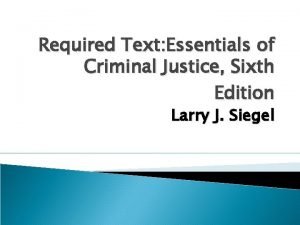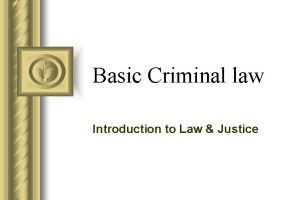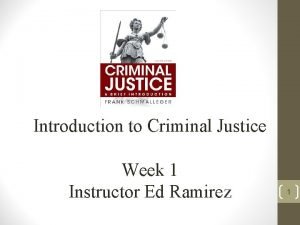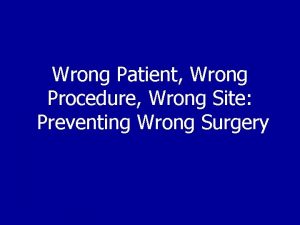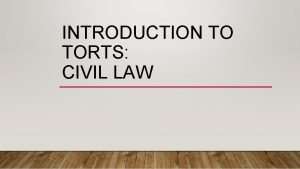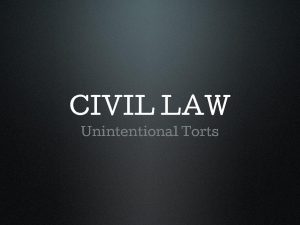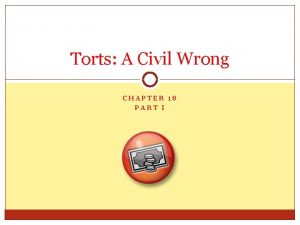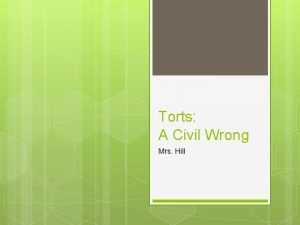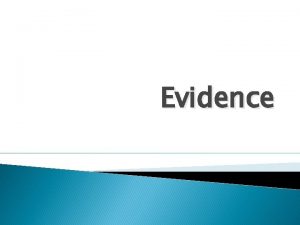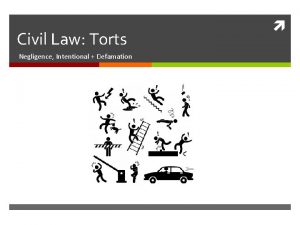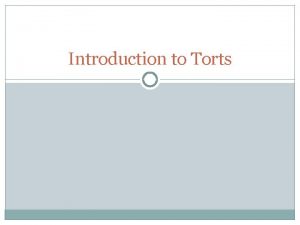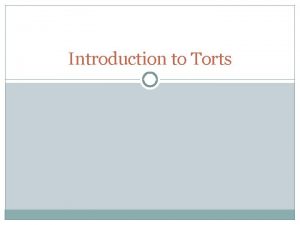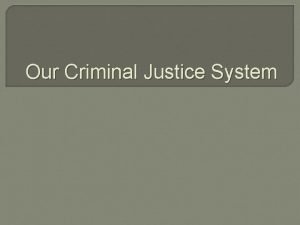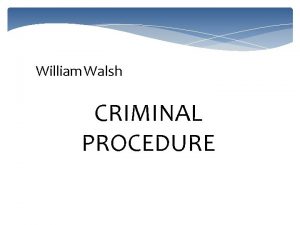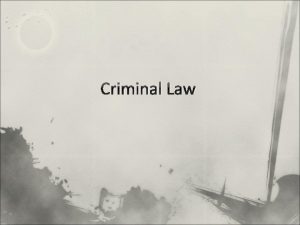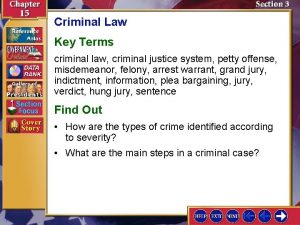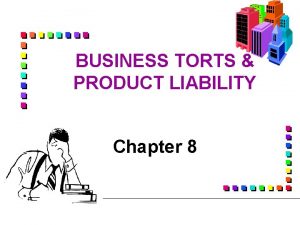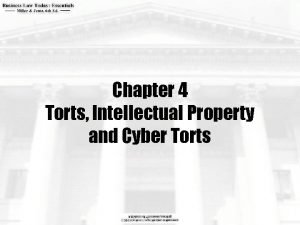TORTS A CIVIL WRONG Torts In criminal lawwhen













































- Slides: 45

TORTS A CIVIL WRONG

Torts �In criminal law…when someone commits a wrong it is called a crime. �In civil law…when someone commits a wrong it is called a tort. �Tort - when one person causes injury to another person, their property, or their reputation.

Torts �The same action can aspects that can be tried in civil and criminal courts. �Someone breaks into a house. . . Criminal court trial – prosecuted by the state for the crimes committed B&E, larceny, etc) Civil court trial – sued by the homeowner for the civil wrongs committed (property damage or stolen property)

Torts �Tort law requires us to act with reasonable care towards other people and their property. �Failure to exercise reasonable care may result in legal liability (legal responsibility for harm) for the wrongdoing. “Caution: Wet Floor” signs reflect reasonable care. Therefore if someone falls, the building/company is not liable.

Torts �When a tort is committed, 2 main questions arise: Who, if anyone, should be liable for harm caused by human actions? How much money should the liable person/party have to pay?

Torts �Remember, in civil cases the parties are called… The plaintiff – the person suing The defendant – the person being sued; concerning torts, the person who is accused of committing a civil wrong. �Judgment – the decision in the case Plaintiff tries to win the judgment against the defendant �Damages – the monetary payout to compensate for wrongdoing If plaintiff wins the judgment, the defendant must pay damages.

Tort Cases �Before going to court, the two parties can meet to discuss how to compensate the injured person. Use one of the methods of dispute resolution. �Hopefully, they can agree on a settlement (a mutual agreement about damages). 90% of tort cases are settled without going to trial

Torts: An Example �Case: Evan claimed Martha shoved him, causing him to fall down a flight of stairs and break his leg. �Plaintiff: Evan wants $5, 000 to compensate for his injury (medical bills, etc) �Defendant: Martha �Could go 1 of 3 ways… Martha could acknowledge that she acted unreasonably and agree to pay a settlement of $5, 000 Martha could argue that she did not act unreasonably (Evan bumped into her and tripped down the stairs) and refuse to pay monetary compensation Evan could sue Martha in court Martha might admit to nudging Evan a little bit but claim that she should only have to pay $4, 000, because the $5, 000 that Evan wants includes a DVD player and an HBO subscription which he bought when he was in bed if the court rules that Martha did not act unreasonably then Evan would not receive any damages.

Tort Cases � Charles drinks too much alcohol at Happy Hour on a Friday afternoon. His friend, Ruth, advises him to take a taxi home, but he thinks he will be okay if he drives slowly. Not noticing a stop sign, he strikes and kills a pedestrian crossing the street. Criminal Case • Brought by the state • Charged with the crime of negligent homicide or manslaughter • Prosecution has burden of proof – must prove beyond a reasonable doubt that Charles is guilty. Civil (Tort) Case • Brought by the victim’s family • Sue for the tort of wrongful death • For the plaintiff to win the judgment and receive damages, over 50% of the evidence must be in their favor (preponderance of evidence)

Tort Cases �Why in civil cases can the plaintiff win if only 50% of the evidence is in their favor, compared to criminal cases when the prosecution has to prove that the defendant is 100% guilty? The civil standard is easier to meet than the criminal standard because the penalties for those found liable in a tort case are less severe than the penalties for those found guilty of a crime. A person does not go to jail for committing a tort, but instead just pays damages.

Who Can Be Sued for a Tort? �Almost anyone! Individuals, groups of individuals, organizations, businesses, and units of governments. �When suing, you need to sue someone who has money to pay for the damages. Suppose you slip on a wet rag at restaurant that the busboy dropped on the floor. You break your leg as a result of the fall. You will probably sue the restaurant owner, not the busboy, because the owner has more money from which to pay damages.

Who Can Be Sued for a Tort? �Suing a minor (someone under 18)… Must prove that they acted unreasonably for a person of that age and experience. Typically you will sue parents for being negligent (careless).

Who Can Be Sued for a Tort? �When there are many injured parties, they can form a “class” and bring a class action suit against the defendant. The settlement or damages awarded would be divided among the individuals in the class. �Ex: If an entire town gets its drinking water from the same source and a company pollutes the water, the townspeople may form a class and file a class action suit against the company. The settlement or damages awarded would be divided among the townspeople.

Types of Damages �Compensatory damages – money paid to compensate for harm caused Financial harm – lost wages, medical expenses, property value Physical harm – past, present, and future pain and suffering Emotional harm – in some jurisdictions… fright, shock, anxiety, depression, etc. �Ex: Ian, a bicyclist, is hit by Patrick’s car. Ian successfully sues Patrick and is awarded $5, 000 for medical bills, lost wages, and future pain and suffering (he now has permanent nerve damage in his arm).

Case Study: Liar Burglar Story �Liar Clip – start at 2 minutes �This story is based on a real case… Bodine v. Enterprise High School Rick Bodine, a recent graduate, snuck on the roof of Enterprise HS to snatch a floodlight. He fell through a recently painted (black) skylight and fell to the ground below – resulting in paraplegia. Bodine sued the school court ruled in Bodine’s favor because months before this incident, a person fell through a recently painted skylight at a nearby school. The court said that the school knew of this potential danger for months and should have fixed this danger. �NOT a typical ruling for these cases. �Cannot set up death traps for criminals.

Types of Damages �Nominal damages – token amount of money awarded by the court to show that the claim was justified, even if the plaintiff is unable to prove financial harm. Symbolic award of money to recognize that the defendant acted wrongfully even though there was no substantial injury or loss. Usually small amounts of money �Ex: Juan punched Matt in a heated argument. In court, even though it’s shown that Juan acted wrongfully, Matt suffered no serious injury. The court might award $1 in nominal damages to Matt.

Types of Damages �Punitive damages – money paid in excess of the proven financial loss for acts that are malicious, willful, or outrageous. Basically to serve as a warning to others not to engage in such conduct. �Ex: Kate shoots a gun at Mark… Hits – compensatory damages for injuries Misses – nominal damages because no harm was actually inflicted but Kate acted wrongfully; punitive damages because Kate’s action was so outrageous

Tort Examples �For the following examples… Assume that a settlement could not be reached The plaintiff is suing the defendant for damages. If damages are owed, decide whether the damages are compensatory, nominal, and/or punitive AND how much is owed to the plaintiff.

Liable for Damages? �Mr. Green owns a large apartment building. When his janitors wax the lobby floor, they place near the front door a 12 -inch sign that reads: “Caution, Wet Floors. ” Mrs. Gonzalez is hurrying home from shopping carrying two large bags of groceries. She does not see the sign and slips and falls on the freshly waxed floor, injuring her knee and arm. �Who is the plaintiff? �Who is the defendant? �Damages? If so, what kind and how much?

Liable for Damages? �Corina leaves a sharp knife on the kitchen table after making a sandwich. A 3 yr old neighbor who has been invited over to play with Corina’s daughter climbs up on a chair, grabs the knife, and seriously cuts her finger. �Who is the plaintiff? �Who is the defendant? �Should the defendant pay damages to the plaintiff?

Liable for Damages? �Jamal, a school bus driver, has a heart attack while driving the bus. The bus slams into a wall, injuring several students. One month earlier, Jamal’s doctor had warned him about his heart condition. �Who is the plaintiff? �Who is the defendant? �Should the defendant pay damages to the plaintiff?

Liable for Damages? �Matt and Emily are sitting in the upper deck behind first base at a MLB game. A foul ball hit by their team’s star player bounces off a railing, smacking Matt in the head and giving him a concussion. �Who is the plaintiff? �Who is the defendant? �Should the defendant pay damages to the plaintiff?

Liable for Damages? �Jess, an expert auto mechanic, continues to drive her car even though she knows that the brake linings are badly worn. Driving on a rainslicked road at night, she skids into a bicyclist who is riding in the bike lane with a safety light. �Who is the plaintiff? �Who is the defendant? �Should the defendant pay damages to the plaintiff?

Types of Torts Negligence Strict Liability Intentional Wrong Types of Torts

Intentional Wrong �When a person acts with the intent of injuring a person, their property, or reputation. �Example 1: Ali is angry at Tom, so she intentionally smashes his car’s windshield. Who is the plaintiff? Who is the defendant? What does the plaintiff need to prove? What does the defendant need to prove?

Intentional Wrong �Example 2: Lilly writes blog posts online and tweets about how Sarah is a boy crazy drug addict. Sarah sues Lilly for defamation to reputation. Who is the plaintiff? Who is the defendant? What does the plaintiff need to prove? What does the defendant need to prove ?

Defamation �A person’s reputation is protected by laws prohibiting defamation – the communication of a false statement that harms the reputation of a person, business, product, group, government, or nation. Slander – spoken lies Libel – written lies

Defamation �The plaintiff can win the case by… Proving that the defendant KNEW the statement was false (intentionally spreading lies). �The defendant can win the case by… Proving that a statement is TRUE Proving they didn’t know it was false information �The law protects opinion. A movie critic and his/her review of a movie and the actors – implied that it is an opinion, not fact

Libel and Tabloids �To win a defamation suit against the media, a public figure must… Prove a statement was false and caused harm Prove that the statement was made with knowledge of its falsity or with a reckless disregard for whether the statement was true. �Tabloid writers avoid libel by referencing “a source close to the couple…” Essentially placing the truthfulness of the statement in someone else’s hands so they can claim they “didn’t know” the information was false if sued.

Common Intentional Torts � Battery – a person intentionally causes harmful bodily contact with another � Assault – a person intentionally poses a threat of harm accompanied by an apparent present ability to carry out the threat � False imprisonment – restraining the movement of another person � Invasion of privacy – private information that is made public that is objectionable by that person. � Others… emotional disturbance, trespassing, public nuisance, fraudulent marketing

Intentional Wrong - Property �Tort law protects your property in two ways It protects against interference with the owner’s exclusive use of the property It protects against the property being taken or damaged. �Three types of property are protected Real Property � Land the items attached to it such as a house, crops, and fences Personal Property � Property that can be moved such as cars, clothing, and appliances Intellectual Property � The ownership of creations of a person’s mind

Intentional Wrong - Property �Real Property – land the items literally attached to it (houses, fences, crops, etc) The tort of trespass – when a person enters another person’s property without permission. Owner can recover damages from the trespasser even if there is no harm to the property because the law protects the owner’s exclusive right to the property

Intentional Wrong - Property �Personal Property – property that can be moved (cars, clothing, appliances, etc) Suppose a burglar breaks in to your house and steals your television, DVD player, and surround system. If the person is a arrested there will be a criminal prosecution for burglary. You could then sue thief in civil court for the value of the stolen items.

Intentional Wrong - Property �Intellectual Property – ownership of creations of your mind Patent – Recognizes your ownership of the invention www. uspto. gov www. copyright. gov � Only handed out for something truly new � An inventor who gets a patent has a complete monopoly over the product for 20 years can sue for infringement Copyright – Recognizes ownership of the expression � Copyright law protects the copyright for the lifetime of the holder plus 50 years � For infringement on a copyright, the infringement work must be “substantially similar” to the copyrighted work. � It is not unlawful to make another show with a mischievous son and father, but they cannot be yellow and wear the same clothes…

Case Study: Queen & Bowie vs. Vanilla Ice � Both songs � MTV News Clip � Vanilla Ice became a household name for a while, not because of his talent, but because of the copyright infringement that occurred in 1990 when it came to light that he had sampled Queen and David Bowie’s “Under Pressure” without consent or license. � Ice Baby hit number one on the charts in the United States. He altered the rhythm of the baseline thinking he would thereby avoid any question of credit, royalties, license or even permission. � This case never went to court as it was clear that Vanilla Ice had used the sample without permission. He settled out of court with Queen and David Bowie for an undisclosed but very likely very high amount. Ice Baby has been released in many different versions, since then, with all of the legal procedures followed � Sorry that beat will most definitely be stuck in your head the rest of the day…

Common Defenses to Intentional Torts �Privilege – exempts a person from liability for his/her conduct Ex: a store owner’s privilege of detaining a suspected shoplifter. �Consent – a person freely approving of something that would otherwise be an intentional tort �Self-defense – to protect oneself from a threatening battery or assault. Also extends to protecting other people and their property.

Negligence � An unintentional wrong. Occurs when a person’s failure to use reasonable care causes harm. � Examples: Dr. House, a surgeon, forgets to remove a clamp from a patient’s body while operating and stitches the patient up. Elmer Fudd leaves a loaded rifle on the floor where his younger brothers and sisters usually play. A child is shot. A city employee working in a manhole forgets to replace the cover when he goes to lunch and a pedestrian falls in and is injured. A drug company markets a birth control device for women without conducting adequate medical testing. It assumes the device is safe because people have used similar device for years. A woman develops a serious illness from using the device.

DUTY The defendant owed a duty of care BREACH OF DUTY The defendant’s conduct violated that duty 4 Elements to Prove Negligence CAUSATION The defendant’s conduct caused the harm DAMAGES The plaintiff suffered actual injuries or losses

Negligence �Example: Suzy is a beach lifeguard. She is texting on her phone when a boy drowns in a wave. Duty: to act a lifeguard and help people in trouble Breach of duty: Suzy failed to act on her lifeguard duties Causation: Suzy’s lack of action caused the boy to drown. Damages: The boy died.

Negligence �Mc. Donald’s Case Who was the plaintiff? Who was the defendant? What, if anything, did the defendant do wrong? What, if anything, did the plaintiff do wrong? Did the defendant cause harm on purpose? Did the defendant’s conduct in some way cause the harm suffered by the plaintiff? What duty, if any, did the defendant have toward its customer? Did the defendant uphold or breach that duty? Agree or disagree with the outcome of the trial? Why do you think the punitive damages were so much more than the compensatory damages?

Wrongful Death �Any type of fatal situation caused by negligence Car crashes Medical malpractice Companies acting irresponsibly Criminal behavior Occupational exposure to dangerous conditions �Must prove: Duty: defendant had some duty to act responsibly Breach of duty: the death of a human being; Causation: death was caused by another's negligence Damages: the surviving family members are suffering injury as a result of the death

Waiver �Waiver – A release from legal liability. Used before participating in certain dangerous activities.

Strict Liability �The legal responsibility for damage or injury even if you are not negligent. The defendant is liable to the plaintiff regardless of fault or if the defendant took all precautions necessary and acted with reasonable care. � 3 main groups face lawsuits involving strict liability: People who engage in highly dangerous activities (ex: a demolition company that uses explosives) People who own dangerous animals (ex: owners of dogs with a violent history) Companies that manufacture products (ex: car manufacturers that run cars through many tests to make sure the cars are not defective)

Strict Liability �To win a strict liability lawsuit, the plaintiff must prove that the action… Is the type of unreasonably dangerous activity to which strict liability applied Resulted in damages and losses Caused the damages and losses

Strict Liability �Product Liability The legal responsibility of manufacturers for injuries caused by defective products Every year more than one million consumers suffer from product-related injuries, nearly half of them sue for damages. Example: In 1990’s more than 5. 8 million Americans began taking weight loss drugs, including a product called fen-phen. About 20% of those taking fen-phen developed serious heart problems, and some of them lost normal heart function. Several people sued to recover damages and fen-phen was pulled off the shelves.
 Iambic pentameter
Iambic pentameter Difference between civil and criminal law table
Difference between civil and criminal law table Difference between civil law and criminal law
Difference between civil law and criminal law Criminal law plaintiff
Criminal law plaintiff Difference between civil and criminal law table
Difference between civil and criminal law table Criminal cases vs civil cases
Criminal cases vs civil cases Civil rights and civil liberties webquest
Civil rights and civil liberties webquest Mc donalds tort
Mc donalds tort Incorporeal property examples
Incorporeal property examples Definition of law of torts
Definition of law of torts Ftca coverage
Ftca coverage Injuria sine damno and damnum sine injuria difference
Injuria sine damno and damnum sine injuria difference Types of torts in healthcare
Types of torts in healthcare Torts class
Torts class Intentional injury examples
Intentional injury examples Onguard online the case of the cyber criminal
Onguard online the case of the cyber criminal Criminal definition
Criminal definition Four pillars of justice
Four pillars of justice Responsibilities of saps in the criminal justice system
Responsibilities of saps in the criminal justice system Management in criminal justice organizations
Management in criminal justice organizations Criminal justice lesson
Criminal justice lesson Southern connecticut state university criminal justice
Southern connecticut state university criminal justice Pareja criminal
Pareja criminal Biotipologia criminal
Biotipologia criminal Vermont association of criminal defense lawyers
Vermont association of criminal defense lawyers Notas rojas
Notas rojas Conflict theory criminal justice
Conflict theory criminal justice Criminal contempt
Criminal contempt Cornwall police check
Cornwall police check Criminal justice the essentials 5th edition
Criminal justice the essentials 5th edition Criminal epidiomology
Criminal epidiomology The criminal man
The criminal man Criminal justice wedding cake diagram
Criminal justice wedding cake diagram Law and order vs csi
Law and order vs csi What is the criminal justice funnel
What is the criminal justice funnel General defences in tort
General defences in tort Causation in criminal law
Causation in criminal law Mala prohibita
Mala prohibita Butterfly or criminal
Butterfly or criminal Consensus model criminal justice
Consensus model criminal justice Criminal tracking number michigan
Criminal tracking number michigan Criminal
Criminal Consensus model criminal justice
Consensus model criminal justice New york state division of criminal justice services
New york state division of criminal justice services Lack of time perspective
Lack of time perspective Consensus model criminal justice
Consensus model criminal justice



